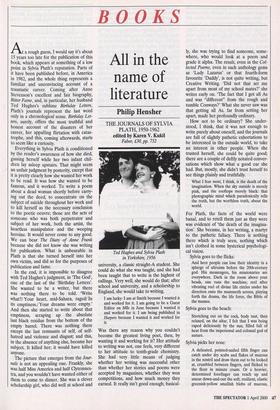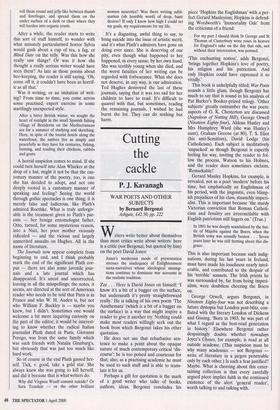BOOKS
At a rough guess, I would say it's about 15 years too late for the publication of this book, which appears at something of a low point in Sylvia Plath's reputation. Parts of it have been published before, in America in 1982, and the whole thing represents a familiar and unconvincing account of a traumatic career. Coming after Anne Stevenson's excellent and fair biography, Bitter Fame, and, in particular, her husband Ted Hughes's sublime Birthday Letters, Plath's journals represent the last word only in a chronological sense. Birthday Let- ters, surely, offers the most truthful and honest account of the disasters of her career, her appalling flirtation with catas- trophe, and this, coming afterwards, starts to seem like a curiosity.
Everything in Sylvia Plath is conditioned by the reader's awareness of how she died, gassing herself while her two infant chil- dren lay asleep upstairs. That might seem an unfair judgment by posterity, except that it is pretty clearly how she wanted her work to be read. It was how she wanted to be famous, and it worked. To write a poem about a dead woman shortly before carry- ing out the deed, to concentrate on the subject of suicide throughout her work and to kill herself as the necessary conclusion to the poetic oeuvre; those are the acts of someone who was both perpetrator and subject of her work, both the artist, the heartless manipulator and the weeping heroine. It would never come to any good. We can bear The Diary of Anne Frank because she did not know she was writing for publication. What is unbearable in Plath is that she turned herself into her own victim, and did so for the purposes of publication and fame.
In the end, it is impossible to disagree with Ted Hughes's judgment, in 'The God', one of the last of the 'Birthday Letters'. She wanted to be a writer, but there was nothing there to be told. 'Write what?! Your heart, mid-Sahara, raged/ In its emptiness./ Your dreams were empty.' And then she started to write about that emptiness, scraping up the absolute last black residue from the bottom of the empty barrel. There was nothing there except the last remnants of self, of self- hatred and violence and disgust; and this, in the absence of anything else, became her subject. It killed her; it would have killed anyone.
The picture that emerges from the Jour- nals is not an appealing one. Frankly, she was half Miss America and half Clytemnes- tra, and you wouldn't have wanted either of them to come to dinner. She was a clever scholarship girl, who did well at school and
All in the name of literature
Philip Hensher
THE JOURNALS OF SYLVIA PLATH, 1950-1962 edited by Karen V. Kukil Faber, £30, pp. 732
Ted Hughes and Sylvia Plath in Yorkshire, 1956 university, a classic straight-A student. She could do what she was taught, and she had been taught that to write is the highest of callings. Very well, she would do that; after school and university, and a scholarship to England, she would take to writing.
I am lucky: I am at Smith because I wanted it and worked for it. I am going to be a Guest Editor on Mlle in June because I wanted it and worked for it. I am being published in Harpers because I wanted it and worked for it.
Was there any reason why you couldn't become the greatest living poet, then, by wanting it and working for it? Her attitude to writing was not, one feels, very different to her attitude to tenth-grade chemistry. She had very little means of judging whether her writing was successful other than whether her stories and poems were accepted by magazines, whether they won competitions, and how much money they earned. It really isn't good enough; basical- ly, she was trying to find someone, some- where, who would look at a poem and grade it alpha. The result, even in the Col- lected Poems, even in such anthology gems as 'Lady Lazarus' or that fourth-form favourite 'Daddy', is not quite writing, but Creative Writing. Did not that set me apart from most of my school mates?' she writes early on. 'The fact that I got all As and was "different" from the rough and tumble Conways?' What she never saw was that getting all As, far from setting her apart, made her profoundly ordinary.
How not to be ordinary? She under- stood, I think, that it was not enough to write purely about oneself, and the journals are full of slightly pathetic exhortations to be interested in the outside world, to take an interest in other people. When she trusted herself, she could be quite good; there are a couple of deftly notated conver- sations which show what a good ear she had. But, mostly, she didn't trust herself to see things plainly and truthfully.
What I fear most, I think, is the death of the imagination. When the sky outside is merely pink, and the rooftops merely black: that photographic mind which paradoxically tells the truth, but the worthless truth, about the world.
For Plath, the facts of the world were banal, and to retell them just as they were was evidence of 'the death of the imagina- tion'. She became, in her writing, a martyr to the pathetic fallacy. There is nothing there which is truly seen, nothing which isn't clothed in some hysterical psychologi- cal vision.
Sylvia goes to the flicks: And here people can lose their identity in a splurge of altruism before the 20th-century god. His messengers, his missionaries are everywhere. Dark in the room above your heads, one runs the machine; reel after vibrating reel of divine life circles under his direction onto the mammoth screen, playing forth the drama, the life force, the Bible of the-masses.
Sylvia goes to the beach: Stretching out on the rock, body taut, then relaxed, on the altar, I felt that I was being raped deliciously by the sun, filled full of heat from the impersonal and colossal god of nature.
Sylvia picks her nose: A delicated, pointed-nailed fifth finger can catch under dry scabs and flakes of mucous in the nostril and draw them out to be looked at, crumbled between fingers, and flicked to the floor in minute crusts. Or a heavier, determined forefinger can reach up and smear down-and-out the soft, resilient, elastic greenish-yellow smallish blobs of mucous, roll them round and jelly-like between thumb and forefinger, and spread them on the under surface of a desk or chair where they will harden into organic crusts.
After a while, the reader starts to write this sort of stuff himself, to wonder with what minutely particularised horror Sylvia would gush about a cup of tea, a fag, or Blind Date on the telly. Was this how she really saw things? Or was it how she thought a really serious writer would have seen them? As late as those poems about bee-keeping, the reader is still saying, 'Oh, come off it, it couldn't have been as horrif- ic as all that.'
Was it writing, or an imitation of writ- ing? From time to time, you come across some practised, expert exercise in some startlingly unexpected style.
After a bitter British winter, we sought the heart of sunlight in the small Spanish fishing village of Benidorm on the Mediterranean sea for a summer of studying and sketching. Here, in spite of the tourist hotels along the waterfront, the natives live as simply and peacefully as they have for centuries, fishing, farming, and tending their chickens, rabbits and goats.
A horrid suspicion comes to mind. If she could turn herself into Alan Whicker at the drop of a hat, might it not be that the cus- tomary manner of the poetry, too, is one she has decided to adopt, and not one deeply rooted in a customary manner of speaking and feeling? Seeing the world through gothic spectacles is one thing; it is merely false and ludicrous, like Plath's admired Roethke. What is truly unforgiv- able is the treatment given to Plath's par- ents — her benign entomologist father, Otto, turned, for some mysterious reason, into a Nazi, her poor mother viciously ridiculed — and the vicious and largely unmerited assaults on Hughes. All in the name of literature.
The Journals now appear complete from beginning to end, and I think probably mark the end of the significant Plath cor- pus — there are also some juvenile jour- nals and a late journal which has disappeared. It's uncut and uncorrected, leaving in all the misspellings; the notes, it seems, are directed at the sort of American reader who needs to be told that Paris is in France and who W. H. Auden is, but not who William F. Buckley is — maybe you knew, but I didn't. Sometimes one would welcome a bit more inquiring curiosity on the part of the editor; it would be interest- ing to know whether the radical Italian journalist Plath dated in Paris, Giovanni Perego, was from the same family which was such friends with Natalia Ginzburg's, but obviously that was just too much like hard work.
So of course in the end Plath gassed her- self. Tick, v. good, take a gold star. She always knew she was going to kill herself, and did it because that is what writers do.
Why did Virginia Woolf commit suicide? Or
Sara Teasdale — or the other brilliant women neurotics? Was there writing subli- mation (oh horrible word) of deep, basic desires? If only I knew how high I could set my goals, my requirements for my life.
It's a disgusting, awful thing to say, to bring suicide into the issue of artistic merit, and it's what Plath's admirers have gone on doing ever since. She is deserving of our pity, even though what happened to her happened, in every sense, by her own hand. She was terribly young when she died, and the worst fatuities of her writing can be regarded with forbearance. What she does not deserve, in any way, is our admiration. Ted Hughes destroyed the last of these journals, saying that it was too sad for her children to have to read. It's difficult to quarrel with that, but sometimes, reading the remaining journals, I wished he had burnt the lot. They can do nothing but harm.























































































 Previous page
Previous page